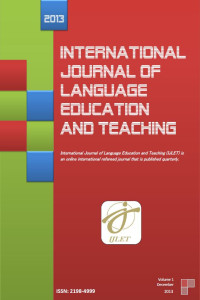Öz
In recent years, constructivism has offered considerable suggestions in teaching and learning process. Constructivist teacher education emphasizes two major concepts: reflection and collaboration. Reflection can be defined as being aware of one’s own teaching. Hence, reflective teaching which is based on constructivism has received considerable attention since it paves the way for teachers to internally analyze their teaching with the help of their colleagues. In this sense, having its roots from reflective teaching, Critical Friends Group which is a professional learning community may be applauded as an effective teacher development activity. In a Critical Friends Group program, teachers meet voluntarily to discuss their students’ work or their dilemmas about their teaching in a supportive environment. In this study, it is suggested that an effective teacher development program must assist teachers to be reflective on their teaching through working collaboratively in a supportive professional community. This article seeks to address the implications of a Critical Friends Group program which lasted 8 weeks for further researchers. The participants were 4 voluntary English Language teachers working in a private school. The data was collected using teachers’ diary, the researchers’ field notes, questionnaire and interviews. The findings supported the idea that working in collaboration in a friendly and supportive professional community has a positive impact on teachers to be reflective on their teaching. As a result, they facilitate their teaching practices by the help of their colleagues in a constructivist framework.
Anahtar Kelimeler
Constructivism teacher development reflective teaching critical friends group
Kaynakça
- Bolton, G. (2010). Reflective practice. London, England: Sage Publications. Brooks, J., & Brooks, M. (1993). In search of understanding the case for the constructivist classrooms. Alexandria, Va: ASCD. Cannella, G. S., & Reiff, J. C. (1994). Individual constructivist teacher education: Teachers as empowered learners. Teacher Education Quarterly 21(3), 27-38. Cohen, L. G. (2008). The good, the bad and the messy: The experiences of high school teachers in a critical friends group (Doctorate thesis, New York University, New York, the USA).
Öz
Son yıllarda, yapısalcı kuram eğitim ve öğretim sürecinde oldukça etkili olmuştur. Yapısalcı öğretmen gelişimi yansıtıcı düşünme ve işbirliği gibi 2 önemli kavramı vurgulamaktadır. Yansıtıcı düşünme bir öğretmenin kendi öğretiminin farkında olması olarak tanımlanabilir. Bu nedenle, temelinde yapısalcı kuram olan yansıtıcı öğretim, meslektaşlarının yardımıyla öğretmenlerin kendi öğretimlerini içsel olarak analiz etmelerine olanak sağlamaktadır. Bu bağlamda, kaynağını yansıtıcı öğretimden alan ve bir mesleki gelişim topluluğu olan Eleştirel Arkadaş Grubu etkili bir öğretmen gelişimi yöntemi olarak düşünülebilir. Bir Eleştirel Arkadaş Grubu programında öğretmenler gönüllü bir şekilde buluşarak öğrencilerinin çalışmalarını ya da kendi öğretimleri ile ilgili sorunlarını dayanışma içinde tartışırlar. Bu çalışmada etkili bir öğretmen gelişimi programının öğretmenlerin destekleyici bir mesleki ortamda meslektaşlarıyla dayanışma içinde bulunarak kendi öğretimlerine yansıtıcı bir şekilde yaklaşmalarına yardımcı olması gerektiği önerilmektedir. Bu makale, 8 hafta süren bir Eleştirel Arkadaş Grubu programından yola çıkarak, gelecek araştırmalar için önerilerde bulunmaktadır. Katılımcılar programa gönüllü olarak katılan ve özel bir okulda çalışan 4 İngilizce öğretmeninden oluşmaktadır. Veriler günlük tutma, araştırmacının saha notları, anketler ve yarı yapılandırılmış görüşmelerle toplanmıştır. Çalışmanın sonuçları öğretmenlerin kendi öğretimlerine yansıtıcı bir şekilde yaklaşmalarında samimi ve destekleyici bir ortamda meslektaş dayanışması içinde çalışmanın pozitif bir etkisi olduğunu ileri sürmektedir. Sonuç olarak, öğretmenler kendi öğretimlerini meslektaşlarının yardımıyla yapısalcı bir çerçevede daha etkin bir hale dönüştürebilirler.
Anahtar Kelimeler
Yapısalcı kuram öğretmen gelişimi yansıtıcı öğretim eleştirel arkadaş grubu
Kaynakça
- Bolton, G. (2010). Reflective practice. London, England: Sage Publications. Brooks, J., & Brooks, M. (1993). In search of understanding the case for the constructivist classrooms. Alexandria, Va: ASCD. Cannella, G. S., & Reiff, J. C. (1994). Individual constructivist teacher education: Teachers as empowered learners. Teacher Education Quarterly 21(3), 27-38. Cohen, L. G. (2008). The good, the bad and the messy: The experiences of high school teachers in a critical friends group (Doctorate thesis, New York University, New York, the USA).
Ayrıntılar
| Birincil Dil | İngilizce |
|---|---|
| Konular | Türkçe ve Sosyal Bilimler Eğitimi (Diğer) |
| Bölüm | Araştırma Makalesi |
| Yazarlar | |
| Yayımlanma Tarihi | 30 Aralık 2013 |
| Yayımlandığı Sayı | Yıl 2013 Cilt: 1 Sayı: 1 |

